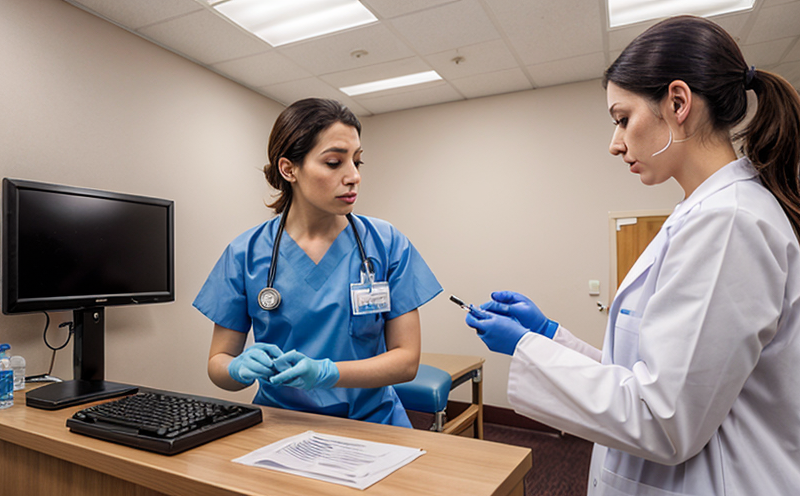Veterinary Drug Neurotoxicity Testing in Rodent Studies
Understanding the potential neurotoxic effects of veterinary drugs is critical to ensuring animal welfare and public safety. This testing service evaluates whether a compound may cause adverse neurological effects, thereby informing safer drug development and regulatory compliance.
The process involves exposing rodents to various concentrations of the test substance under controlled conditions. Neurological assessments are conducted post-exposure using standardized metrics such as motor coordination, behavioral patterns, and electrophysiological measurements. These evaluations help determine if a drug could pose risks beyond its intended therapeutic benefits.
At Eurolab, we utilize state-of-the-art facilities equipped with advanced instrumentation like electroencephalography (EEG) machines and video tracking systems to accurately measure changes in brain activity and motor functions. Our team of experts employs rigorous protocols aligned with international standards such as ISO 10789:2013 and OECD Guidelines for Testing of Chemicals.
Our comprehensive approach ensures accurate identification of neurotoxicity risks, enabling pharmaceutical companies to make informed decisions about their products’ safety profiles. This not only protects animals used in research but also contributes significantly to human health by preventing potentially harmful medications from reaching the market.
The significance of this testing cannot be overstated given that many drugs have been withdrawn post-market due to unforeseen neurotoxic side effects. By incorporating these tests into early-stage development, manufacturers can proactively address any concerns and develop safer alternatives when necessary.
Our services cover a wide range of applications including but not limited to:
- Evaluation of new veterinary drugs for potential neurotoxicity
- Assessment of existing products undergoing formulation changes
- Investigation into off-label uses where neurological effects might occur
- Supporting regulatory submissions by providing robust scientific data
At Eurolab, we pride ourselves on offering reliable and actionable insights that contribute to more responsible drug development practices.
Why It Matters
The importance of veterinary drug neurotoxicity testing lies in its ability to identify potential risks early in the R&D process. Neurotoxic effects can range from subtle behavioral changes to severe motor disabilities, making it essential for both animal and human health.
For instance, certain veterinary medications intended primarily for pain relief or inflammation management have been linked to neurological issues like seizures or cognitive decline when used improperly. Early detection through rigorous testing helps prevent such adverse outcomes by guiding appropriate dosing schedules and identifying contraindications based on individual susceptibility factors.
Moreover, compliance with regulatory requirements ensures the ethical treatment of laboratory animals while upholding public trust in pharmaceutical products. The data generated from these tests play a crucial role in obtaining necessary approvals from governing bodies like the FDA or EMA.
In summary, this testing service is vital for ensuring that veterinary drugs not only perform their intended functions safely but also do so without introducing unnecessary risks to those involved in their use.
Eurolab Advantages
At Eurolab, we pride ourselves on delivering unparalleled quality and reliability through our advanced infrastructure and experienced personnel. Here’s why choosing us for your veterinary drug neurotoxicity testing needs is advantageous:
- Innovative Facilities: Our laboratories are equipped with cutting-edge equipment, including EEG machines capable of recording detailed brainwave patterns.
- Rigorous Protocol Compliance: We strictly adhere to internationally recognized guidelines such as ISO 10789:2013 and OECD Guidelines for Testing of Chemicals.
- Experienced Experts: Our team comprises highly skilled scientists with extensive experience in toxicology research.
- Comprehensive Reporting: We provide detailed reports backed by comprehensive data analysis to support decision-making processes.
- Regulatory Support: Eurolab assists clients in preparing robust submissions for regulatory approval, ensuring compliance at every stage of the process.
With these advantages, we aim to offer a seamless and efficient testing experience tailored specifically to your unique requirements.
Why Choose This Test
- Prioritizes Animal Welfare: By identifying neurotoxicity early on, this test helps minimize suffering during drug development.
- Enhances Product Safety: Ensuring that only safe compounds proceed to market reduces the likelihood of post-release complications.
- Fulfills Regulatory Obligations: Adhering to relevant standards guarantees compliance with international regulations.
- Aids Responsible Innovation: This service encourages more thoughtful and ethical approaches to drug creation, fostering trust among stakeholders.
- Facilitates Data-Driven Decisions: Accurate testing results empower informed choices regarding dosage levels and potential risks.
The combination of these benefits makes this test indispensable for any organization committed to producing high-quality veterinary drugs responsibly.





